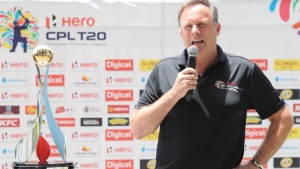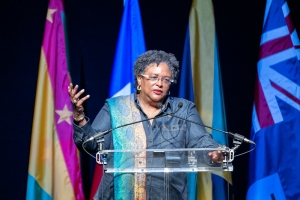With their long-term agreement with Cricket West Indies (CWI) heavily scrutinised by government leaders and cricket stalwarts, chief executive, Pete Russell of the Caribbean Premier League (CPL) defended the product’s positive contribution to cricket in the region.
Addressing the gathering on Friday’s final day of the CARICOM conference on West Indies cricket themed ‘Reinvigorating West Indies Cricket’, Russell said the CPL is one of CWI’s largest domestic commercial partners.
While noting that CPL contributed significantly to player economic welfare, with nearly US$28 million spent on salaries since the start of the tournament in 2013, Russell, also revealed that cumulative losses, across both the league and franchises for the past 11 years, stand at US$40 million.
“Dennis O’Brien and Digicel have been the principal investors, not only investing in the league from day one but they also spent money on sponsorship and media rights. The franchises have also pumped in significant money, money that helps pay players and coaches, as well as investing in local businesses around the region that help make the games happen. All the franchises have made losses.
“So, on the positive side, Cricket West Indies has been paid close to US$17 million in sanction fees, so over the past 12 years CPL would be one of CWI’s largest domestic, commercial partners. Caribbean players have taken home US$27.7 million in player salaries since the tournament’s inception, all paid for by the franchises,” Russell declared during the event held in Trinidad and Tobago.
“Each year, it takes US$25 million to run this tournament over five weeks. CPL and the franchises bear all these costs. There is no financial burden on CWI or the territorial boards, so the risk is 100 per cent ours.
“So that is our starting point each and every year. So as you can imagine, the commercial challenges are considerable just to break even,” he added.

Russell’s response came as government leaders and West Indies legend Sir Clive Lloyd, suggested that the 50-year contract between CPL and CWI be re-negotiated.
The issue of the league’s ownership was also called into question, as they view was largely expressed that there would potentially be more development and earnings for players, if CWI controlled the tournament.
But, Russell, a member of the CPL management team rebutted.
“What is interesting is that other leagues around the world are following the lead of CWI. They are also looking for third-party investors to help fund their leagues. The English Cricket Board are in the process of selling The Hundred, the Australian Cricket Board are courting outside investors for the Big Bash, Cricket South Africa sold all their rights to host broadcaster Supersport, and the new American Major League Cricket is 100 per cent privately owned,” Russell shared.
“In time, only the IPL will end up being 100 per cent owned by its domestic board and that is simply because they can afford to do so. So, trust me when I say, ownership isn’t everything, and smart stewardship and partnership can yield better results. But of course, we’re always happy to listen to any suggestions on how we can improve things,” he ended.





























